Evaluating Leadership, Culture & Social Capital in Tianjin University
VerifiedAdded on 2023/06/18
|9
|2639
|86
Essay
AI Summary
This essay analyzes leadership, culture, and social capital at Tianjin University of Finance and Economics in China. It utilizes Hofstede's six cultural dimensions to assess the university's culture, examining power distance, individualism, masculinity, uncertainty avoidance, long-term orientation, and indulgence. The essay also applies entity and relational approaches to understand the university's structure and external relationships. Furthermore, it explores three forms of social capital—bonding, bridging, and linking—to evaluate the conditions that enable or disable relational leadership practices within the university. The reflection on democratic and autocratic leadership approaches suggests that a democratic style is more suitable for Tianjin University, fostering motivation and optimal resource utilization among professors. This analysis provides insights into the dynamics of leadership and organizational culture within a Chinese university context.
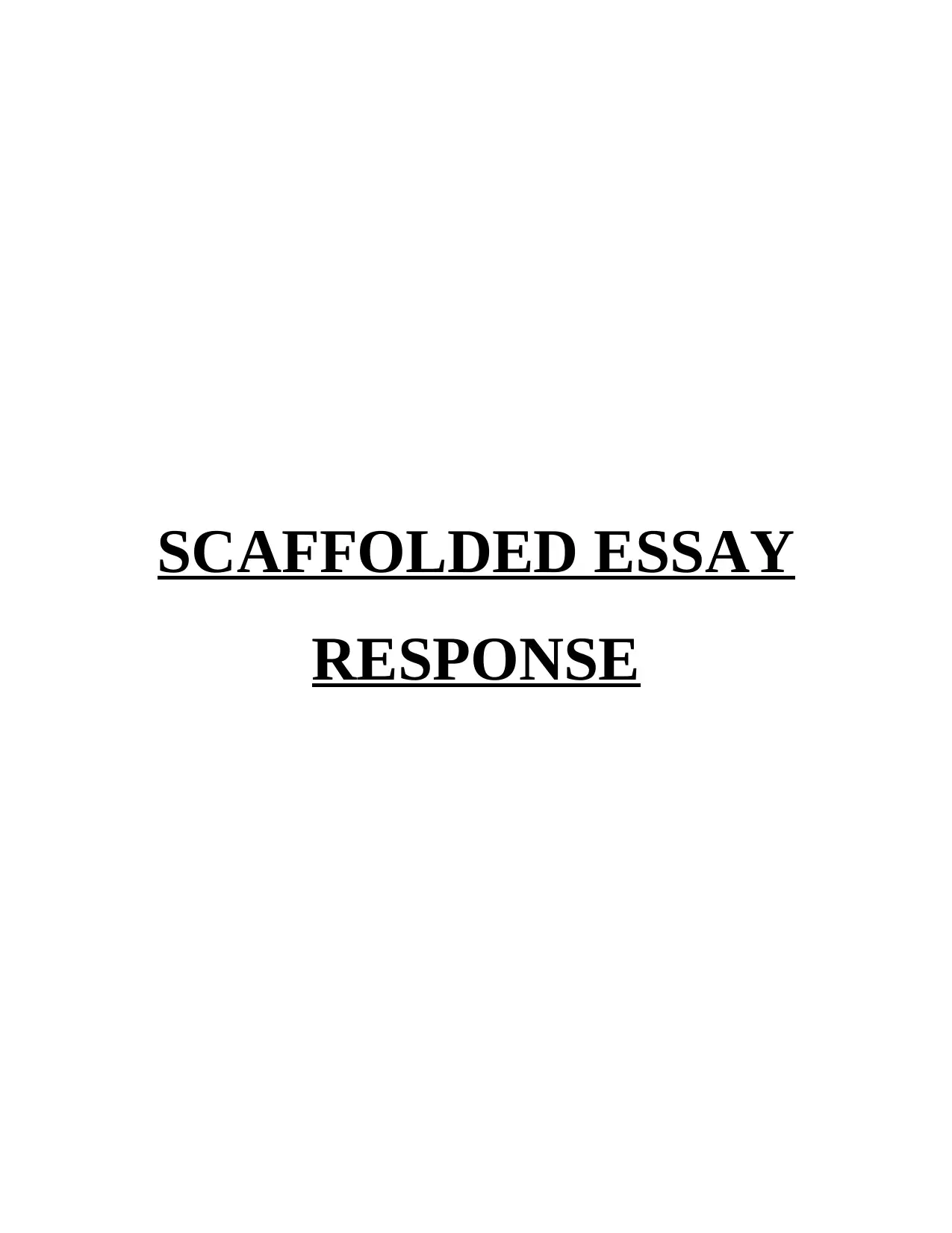
SCAFFOLDED ESSAY
RESPONSE
RESPONSE
Paraphrase This Document
Need a fresh take? Get an instant paraphrase of this document with our AI Paraphraser
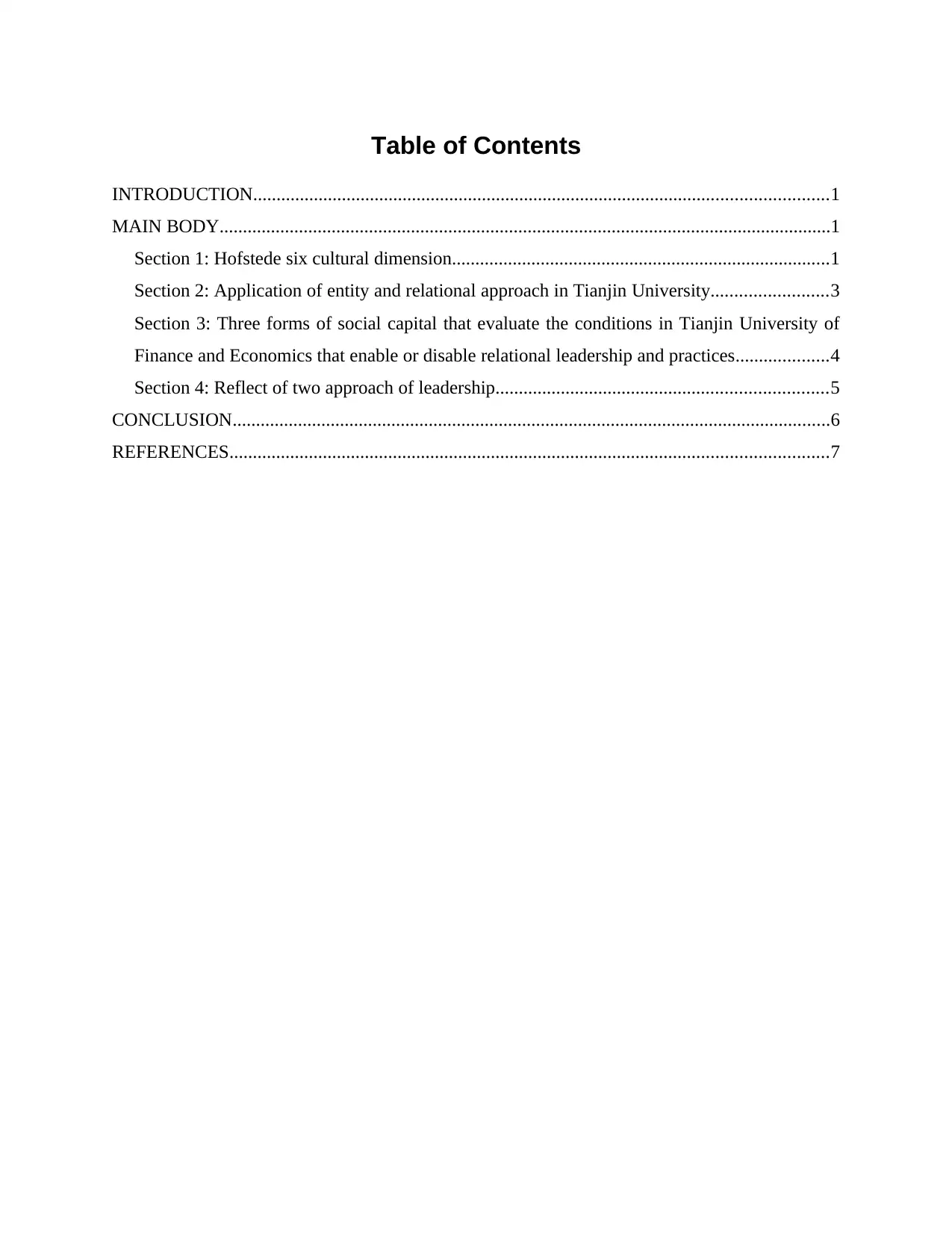
Table of Contents
INTRODUCTION...........................................................................................................................1
MAIN BODY...................................................................................................................................1
Section 1: Hofstede six cultural dimension.................................................................................1
Section 2: Application of entity and relational approach in Tianjin University.........................3
Section 3: Three forms of social capital that evaluate the conditions in Tianjin University of
Finance and Economics that enable or disable relational leadership and practices....................4
Section 4: Reflect of two approach of leadership.......................................................................5
CONCLUSION................................................................................................................................6
REFERENCES................................................................................................................................7
INTRODUCTION...........................................................................................................................1
MAIN BODY...................................................................................................................................1
Section 1: Hofstede six cultural dimension.................................................................................1
Section 2: Application of entity and relational approach in Tianjin University.........................3
Section 3: Three forms of social capital that evaluate the conditions in Tianjin University of
Finance and Economics that enable or disable relational leadership and practices....................4
Section 4: Reflect of two approach of leadership.......................................................................5
CONCLUSION................................................................................................................................6
REFERENCES................................................................................................................................7
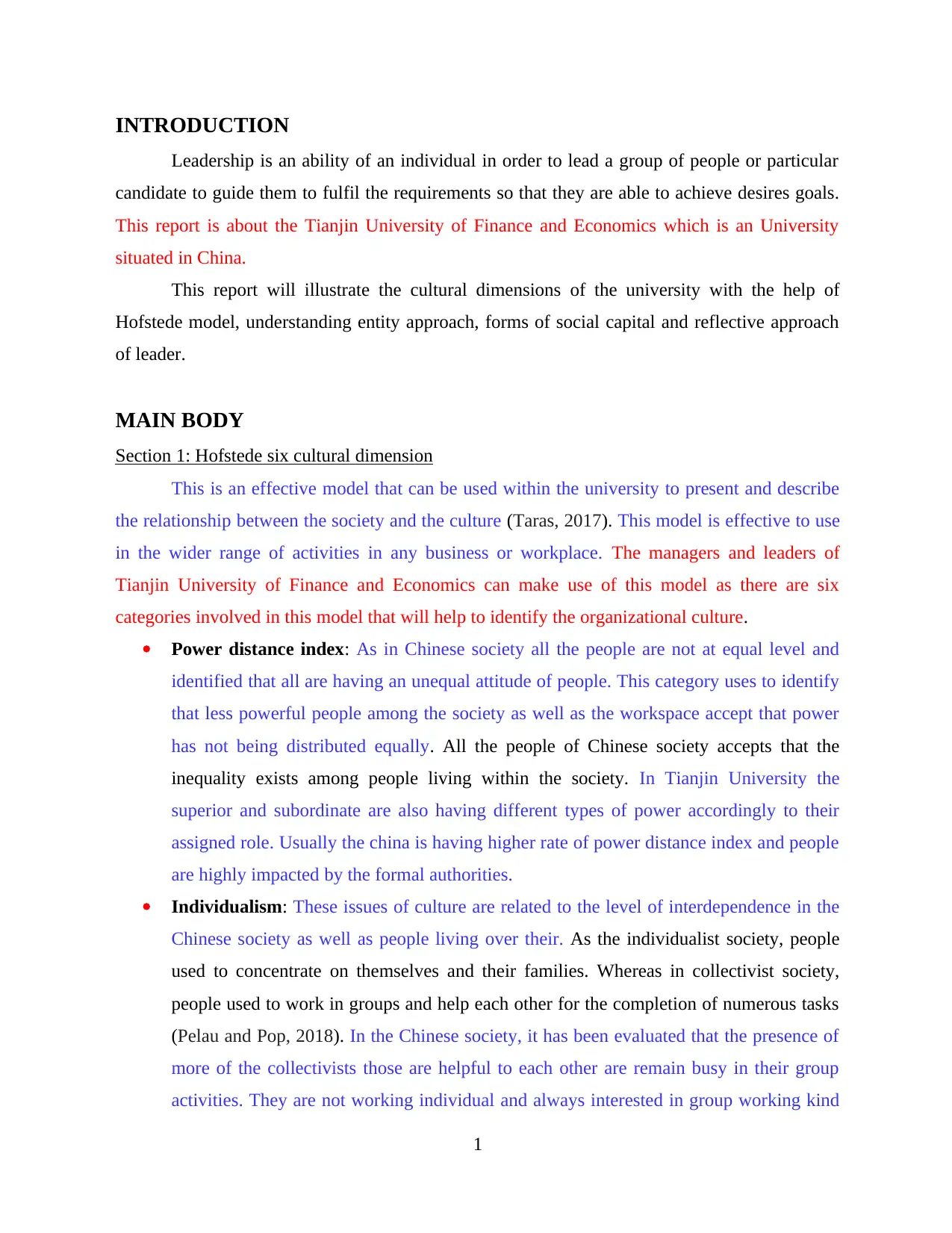
INTRODUCTION
Leadership is an ability of an individual in order to lead a group of people or particular
candidate to guide them to fulfil the requirements so that they are able to achieve desires goals.
This report is about the Tianjin University of Finance and Economics which is an University
situated in China.
This report will illustrate the cultural dimensions of the university with the help of
Hofstede model, understanding entity approach, forms of social capital and reflective approach
of leader.
MAIN BODY
Section 1: Hofstede six cultural dimension
This is an effective model that can be used within the university to present and describe
the relationship between the society and the culture (Taras, 2017). This model is effective to use
in the wider range of activities in any business or workplace. The managers and leaders of
Tianjin University of Finance and Economics can make use of this model as there are six
categories involved in this model that will help to identify the organizational culture.
Power distance index: As in Chinese society all the people are not at equal level and
identified that all are having an unequal attitude of people. This category uses to identify
that less powerful people among the society as well as the workspace accept that power
has not being distributed equally. All the people of Chinese society accepts that the
inequality exists among people living within the society. In Tianjin University the
superior and subordinate are also having different types of power accordingly to their
assigned role. Usually the china is having higher rate of power distance index and people
are highly impacted by the formal authorities.
Individualism: These issues of culture are related to the level of interdependence in the
Chinese society as well as people living over their. As the individualist society, people
used to concentrate on themselves and their families. Whereas in collectivist society,
people used to work in groups and help each other for the completion of numerous tasks
(Pelau and Pop, 2018). In the Chinese society, it has been evaluated that the presence of
more of the collectivists those are helpful to each other are remain busy in their group
activities. They are not working individual and always interested in group working kind
1
Leadership is an ability of an individual in order to lead a group of people or particular
candidate to guide them to fulfil the requirements so that they are able to achieve desires goals.
This report is about the Tianjin University of Finance and Economics which is an University
situated in China.
This report will illustrate the cultural dimensions of the university with the help of
Hofstede model, understanding entity approach, forms of social capital and reflective approach
of leader.
MAIN BODY
Section 1: Hofstede six cultural dimension
This is an effective model that can be used within the university to present and describe
the relationship between the society and the culture (Taras, 2017). This model is effective to use
in the wider range of activities in any business or workplace. The managers and leaders of
Tianjin University of Finance and Economics can make use of this model as there are six
categories involved in this model that will help to identify the organizational culture.
Power distance index: As in Chinese society all the people are not at equal level and
identified that all are having an unequal attitude of people. This category uses to identify
that less powerful people among the society as well as the workspace accept that power
has not being distributed equally. All the people of Chinese society accepts that the
inequality exists among people living within the society. In Tianjin University the
superior and subordinate are also having different types of power accordingly to their
assigned role. Usually the china is having higher rate of power distance index and people
are highly impacted by the formal authorities.
Individualism: These issues of culture are related to the level of interdependence in the
Chinese society as well as people living over their. As the individualist society, people
used to concentrate on themselves and their families. Whereas in collectivist society,
people used to work in groups and help each other for the completion of numerous tasks
(Pelau and Pop, 2018). In the Chinese society, it has been evaluated that the presence of
more of the collectivists those are helpful to each other are remain busy in their group
activities. They are not working individual and always interested in group working kind
1
⊘ This is a preview!⊘
Do you want full access?
Subscribe today to unlock all pages.

Trusted by 1+ million students worldwide
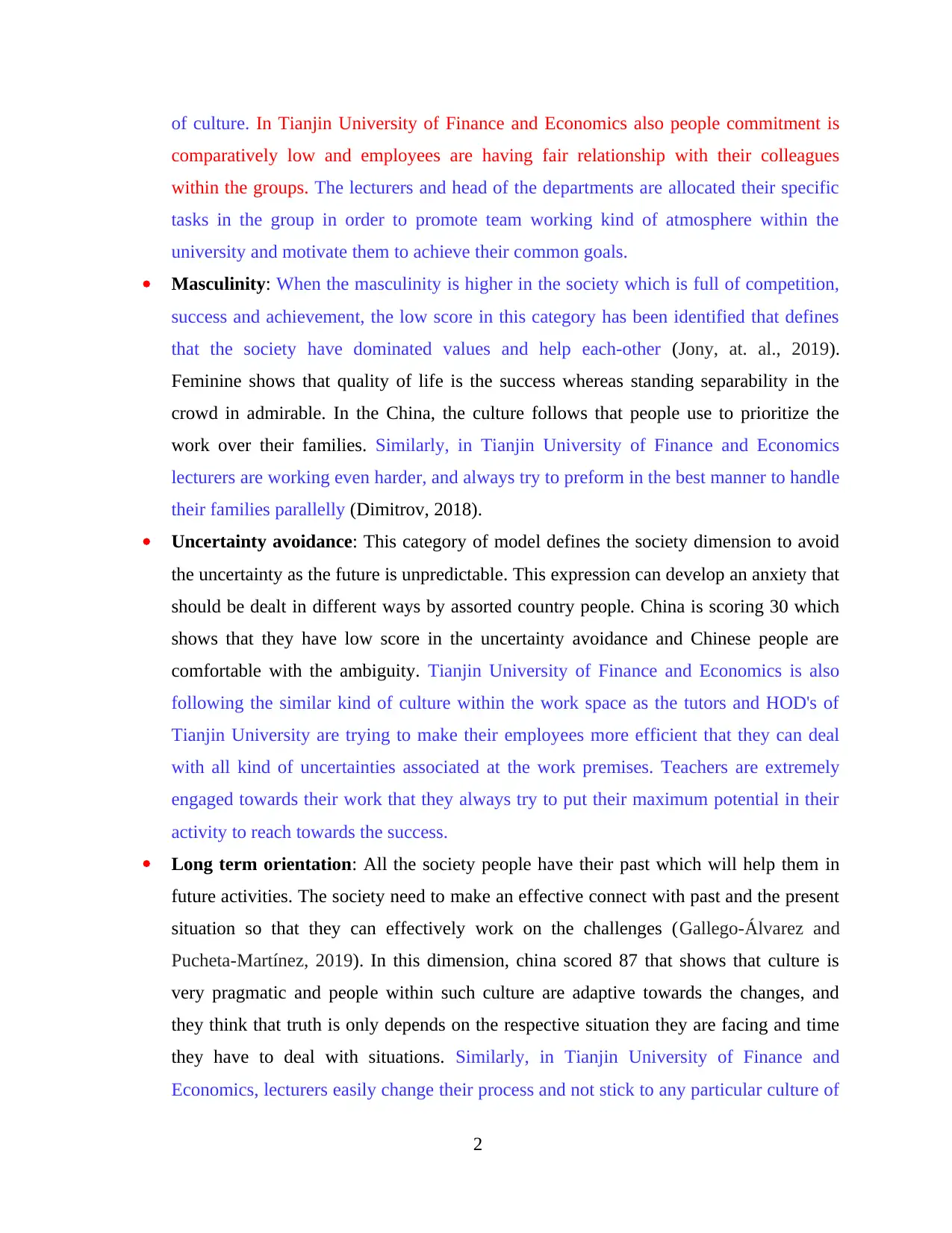
of culture. In Tianjin University of Finance and Economics also people commitment is
comparatively low and employees are having fair relationship with their colleagues
within the groups. The lecturers and head of the departments are allocated their specific
tasks in the group in order to promote team working kind of atmosphere within the
university and motivate them to achieve their common goals.
Masculinity: When the masculinity is higher in the society which is full of competition,
success and achievement, the low score in this category has been identified that defines
that the society have dominated values and help each-other (Jony, at. al., 2019).
Feminine shows that quality of life is the success whereas standing separability in the
crowd in admirable. In the China, the culture follows that people use to prioritize the
work over their families. Similarly, in Tianjin University of Finance and Economics
lecturers are working even harder, and always try to preform in the best manner to handle
their families parallelly (Dimitrov, 2018).
Uncertainty avoidance: This category of model defines the society dimension to avoid
the uncertainty as the future is unpredictable. This expression can develop an anxiety that
should be dealt in different ways by assorted country people. China is scoring 30 which
shows that they have low score in the uncertainty avoidance and Chinese people are
comfortable with the ambiguity. Tianjin University of Finance and Economics is also
following the similar kind of culture within the work space as the tutors and HOD's of
Tianjin University are trying to make their employees more efficient that they can deal
with all kind of uncertainties associated at the work premises. Teachers are extremely
engaged towards their work that they always try to put their maximum potential in their
activity to reach towards the success.
Long term orientation: All the society people have their past which will help them in
future activities. The society need to make an effective connect with past and the present
situation so that they can effectively work on the challenges (Gallego-Álvarez and
Pucheta-Martínez, 2019). In this dimension, china scored 87 that shows that culture is
very pragmatic and people within such culture are adaptive towards the changes, and
they think that truth is only depends on the respective situation they are facing and time
they have to deal with situations. Similarly, in Tianjin University of Finance and
Economics, lecturers easily change their process and not stick to any particular culture of
2
comparatively low and employees are having fair relationship with their colleagues
within the groups. The lecturers and head of the departments are allocated their specific
tasks in the group in order to promote team working kind of atmosphere within the
university and motivate them to achieve their common goals.
Masculinity: When the masculinity is higher in the society which is full of competition,
success and achievement, the low score in this category has been identified that defines
that the society have dominated values and help each-other (Jony, at. al., 2019).
Feminine shows that quality of life is the success whereas standing separability in the
crowd in admirable. In the China, the culture follows that people use to prioritize the
work over their families. Similarly, in Tianjin University of Finance and Economics
lecturers are working even harder, and always try to preform in the best manner to handle
their families parallelly (Dimitrov, 2018).
Uncertainty avoidance: This category of model defines the society dimension to avoid
the uncertainty as the future is unpredictable. This expression can develop an anxiety that
should be dealt in different ways by assorted country people. China is scoring 30 which
shows that they have low score in the uncertainty avoidance and Chinese people are
comfortable with the ambiguity. Tianjin University of Finance and Economics is also
following the similar kind of culture within the work space as the tutors and HOD's of
Tianjin University are trying to make their employees more efficient that they can deal
with all kind of uncertainties associated at the work premises. Teachers are extremely
engaged towards their work that they always try to put their maximum potential in their
activity to reach towards the success.
Long term orientation: All the society people have their past which will help them in
future activities. The society need to make an effective connect with past and the present
situation so that they can effectively work on the challenges (Gallego-Álvarez and
Pucheta-Martínez, 2019). In this dimension, china scored 87 that shows that culture is
very pragmatic and people within such culture are adaptive towards the changes, and
they think that truth is only depends on the respective situation they are facing and time
they have to deal with situations. Similarly, in Tianjin University of Finance and
Economics, lecturers easily change their process and not stick to any particular culture of
2
Paraphrase This Document
Need a fresh take? Get an instant paraphrase of this document with our AI Paraphraser
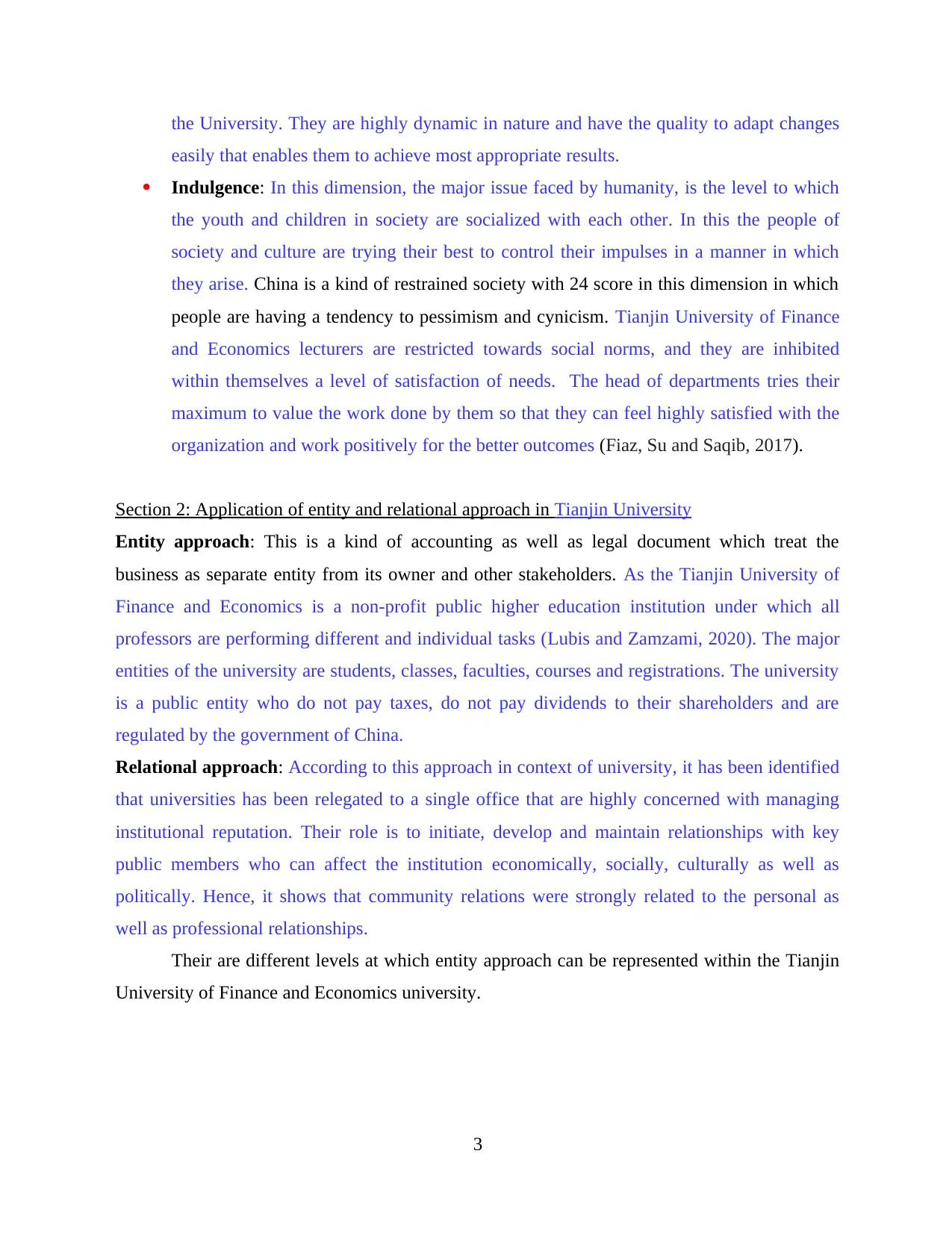
the University. They are highly dynamic in nature and have the quality to adapt changes
easily that enables them to achieve most appropriate results.
Indulgence: In this dimension, the major issue faced by humanity, is the level to which
the youth and children in society are socialized with each other. In this the people of
society and culture are trying their best to control their impulses in a manner in which
they arise. China is a kind of restrained society with 24 score in this dimension in which
people are having a tendency to pessimism and cynicism. Tianjin University of Finance
and Economics lecturers are restricted towards social norms, and they are inhibited
within themselves a level of satisfaction of needs. The head of departments tries their
maximum to value the work done by them so that they can feel highly satisfied with the
organization and work positively for the better outcomes (Fiaz, Su and Saqib, 2017).
Section 2: Application of entity and relational approach in Tianjin University
Entity approach: This is a kind of accounting as well as legal document which treat the
business as separate entity from its owner and other stakeholders. As the Tianjin University of
Finance and Economics is a non-profit public higher education institution under which all
professors are performing different and individual tasks (Lubis and Zamzami, 2020). The major
entities of the university are students, classes, faculties, courses and registrations. The university
is a public entity who do not pay taxes, do not pay dividends to their shareholders and are
regulated by the government of China.
Relational approach: According to this approach in context of university, it has been identified
that universities has been relegated to a single office that are highly concerned with managing
institutional reputation. Their role is to initiate, develop and maintain relationships with key
public members who can affect the institution economically, socially, culturally as well as
politically. Hence, it shows that community relations were strongly related to the personal as
well as professional relationships.
Their are different levels at which entity approach can be represented within the Tianjin
University of Finance and Economics university.
3
easily that enables them to achieve most appropriate results.
Indulgence: In this dimension, the major issue faced by humanity, is the level to which
the youth and children in society are socialized with each other. In this the people of
society and culture are trying their best to control their impulses in a manner in which
they arise. China is a kind of restrained society with 24 score in this dimension in which
people are having a tendency to pessimism and cynicism. Tianjin University of Finance
and Economics lecturers are restricted towards social norms, and they are inhibited
within themselves a level of satisfaction of needs. The head of departments tries their
maximum to value the work done by them so that they can feel highly satisfied with the
organization and work positively for the better outcomes (Fiaz, Su and Saqib, 2017).
Section 2: Application of entity and relational approach in Tianjin University
Entity approach: This is a kind of accounting as well as legal document which treat the
business as separate entity from its owner and other stakeholders. As the Tianjin University of
Finance and Economics is a non-profit public higher education institution under which all
professors are performing different and individual tasks (Lubis and Zamzami, 2020). The major
entities of the university are students, classes, faculties, courses and registrations. The university
is a public entity who do not pay taxes, do not pay dividends to their shareholders and are
regulated by the government of China.
Relational approach: According to this approach in context of university, it has been identified
that universities has been relegated to a single office that are highly concerned with managing
institutional reputation. Their role is to initiate, develop and maintain relationships with key
public members who can affect the institution economically, socially, culturally as well as
politically. Hence, it shows that community relations were strongly related to the personal as
well as professional relationships.
Their are different levels at which entity approach can be represented within the Tianjin
University of Finance and Economics university.
3
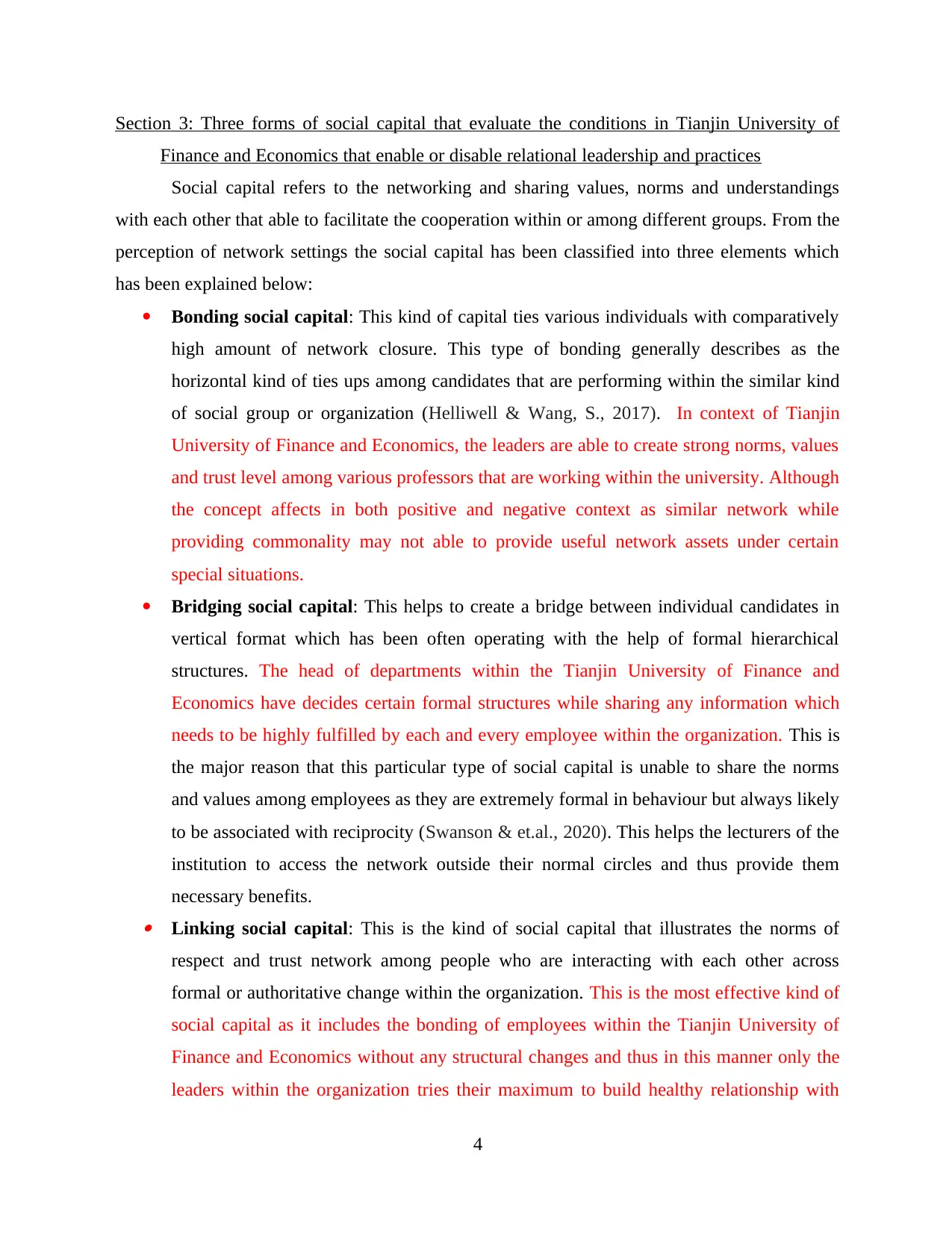
Section 3: Three forms of social capital that evaluate the conditions in Tianjin University of
Finance and Economics that enable or disable relational leadership and practices
Social capital refers to the networking and sharing values, norms and understandings
with each other that able to facilitate the cooperation within or among different groups. From the
perception of network settings the social capital has been classified into three elements which
has been explained below:
Bonding social capital: This kind of capital ties various individuals with comparatively
high amount of network closure. This type of bonding generally describes as the
horizontal kind of ties ups among candidates that are performing within the similar kind
of social group or organization (Helliwell & Wang, S., 2017). In context of Tianjin
University of Finance and Economics, the leaders are able to create strong norms, values
and trust level among various professors that are working within the university. Although
the concept affects in both positive and negative context as similar network while
providing commonality may not able to provide useful network assets under certain
special situations.
Bridging social capital: This helps to create a bridge between individual candidates in
vertical format which has been often operating with the help of formal hierarchical
structures. The head of departments within the Tianjin University of Finance and
Economics have decides certain formal structures while sharing any information which
needs to be highly fulfilled by each and every employee within the organization. This is
the major reason that this particular type of social capital is unable to share the norms
and values among employees as they are extremely formal in behaviour but always likely
to be associated with reciprocity (Swanson & et.al., 2020). This helps the lecturers of the
institution to access the network outside their normal circles and thus provide them
necessary benefits. Linking social capital: This is the kind of social capital that illustrates the norms of
respect and trust network among people who are interacting with each other across
formal or authoritative change within the organization. This is the most effective kind of
social capital as it includes the bonding of employees within the Tianjin University of
Finance and Economics without any structural changes and thus in this manner only the
leaders within the organization tries their maximum to build healthy relationship with
4
Finance and Economics that enable or disable relational leadership and practices
Social capital refers to the networking and sharing values, norms and understandings
with each other that able to facilitate the cooperation within or among different groups. From the
perception of network settings the social capital has been classified into three elements which
has been explained below:
Bonding social capital: This kind of capital ties various individuals with comparatively
high amount of network closure. This type of bonding generally describes as the
horizontal kind of ties ups among candidates that are performing within the similar kind
of social group or organization (Helliwell & Wang, S., 2017). In context of Tianjin
University of Finance and Economics, the leaders are able to create strong norms, values
and trust level among various professors that are working within the university. Although
the concept affects in both positive and negative context as similar network while
providing commonality may not able to provide useful network assets under certain
special situations.
Bridging social capital: This helps to create a bridge between individual candidates in
vertical format which has been often operating with the help of formal hierarchical
structures. The head of departments within the Tianjin University of Finance and
Economics have decides certain formal structures while sharing any information which
needs to be highly fulfilled by each and every employee within the organization. This is
the major reason that this particular type of social capital is unable to share the norms
and values among employees as they are extremely formal in behaviour but always likely
to be associated with reciprocity (Swanson & et.al., 2020). This helps the lecturers of the
institution to access the network outside their normal circles and thus provide them
necessary benefits. Linking social capital: This is the kind of social capital that illustrates the norms of
respect and trust network among people who are interacting with each other across
formal or authoritative change within the organization. This is the most effective kind of
social capital as it includes the bonding of employees within the Tianjin University of
Finance and Economics without any structural changes and thus in this manner only the
leaders within the organization tries their maximum to build healthy relationship with
4
⊘ This is a preview!⊘
Do you want full access?
Subscribe today to unlock all pages.

Trusted by 1+ million students worldwide
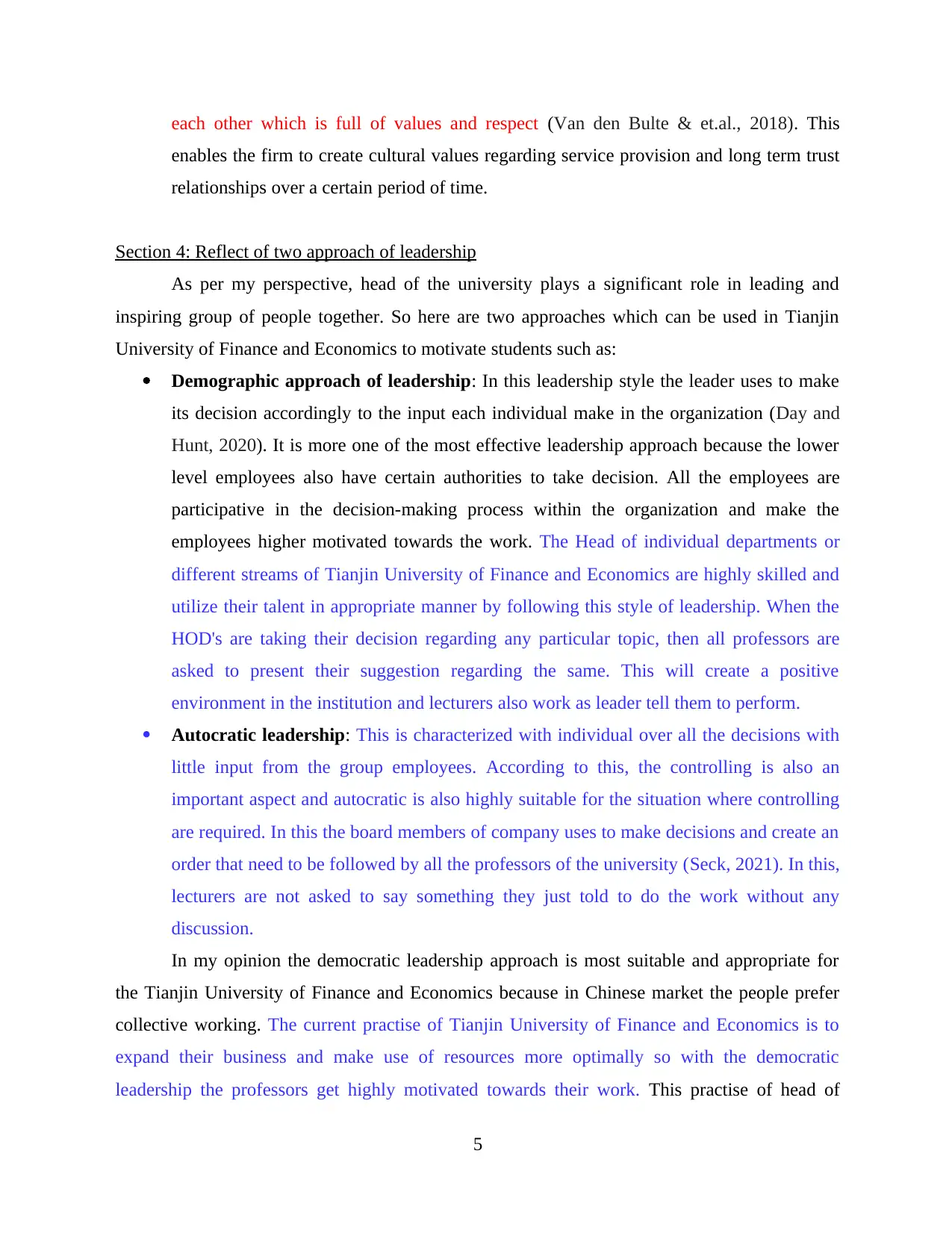
each other which is full of values and respect (Van den Bulte & et.al., 2018). This
enables the firm to create cultural values regarding service provision and long term trust
relationships over a certain period of time.
Section 4: Reflect of two approach of leadership
As per my perspective, head of the university plays a significant role in leading and
inspiring group of people together. So here are two approaches which can be used in Tianjin
University of Finance and Economics to motivate students such as:
Demographic approach of leadership: In this leadership style the leader uses to make
its decision accordingly to the input each individual make in the organization (Day and
Hunt, 2020). It is more one of the most effective leadership approach because the lower
level employees also have certain authorities to take decision. All the employees are
participative in the decision-making process within the organization and make the
employees higher motivated towards the work. The Head of individual departments or
different streams of Tianjin University of Finance and Economics are highly skilled and
utilize their talent in appropriate manner by following this style of leadership. When the
HOD's are taking their decision regarding any particular topic, then all professors are
asked to present their suggestion regarding the same. This will create a positive
environment in the institution and lecturers also work as leader tell them to perform.
Autocratic leadership: This is characterized with individual over all the decisions with
little input from the group employees. According to this, the controlling is also an
important aspect and autocratic is also highly suitable for the situation where controlling
are required. In this the board members of company uses to make decisions and create an
order that need to be followed by all the professors of the university (Seck, 2021). In this,
lecturers are not asked to say something they just told to do the work without any
discussion.
In my opinion the democratic leadership approach is most suitable and appropriate for
the Tianjin University of Finance and Economics because in Chinese market the people prefer
collective working. The current practise of Tianjin University of Finance and Economics is to
expand their business and make use of resources more optimally so with the democratic
leadership the professors get highly motivated towards their work. This practise of head of
5
enables the firm to create cultural values regarding service provision and long term trust
relationships over a certain period of time.
Section 4: Reflect of two approach of leadership
As per my perspective, head of the university plays a significant role in leading and
inspiring group of people together. So here are two approaches which can be used in Tianjin
University of Finance and Economics to motivate students such as:
Demographic approach of leadership: In this leadership style the leader uses to make
its decision accordingly to the input each individual make in the organization (Day and
Hunt, 2020). It is more one of the most effective leadership approach because the lower
level employees also have certain authorities to take decision. All the employees are
participative in the decision-making process within the organization and make the
employees higher motivated towards the work. The Head of individual departments or
different streams of Tianjin University of Finance and Economics are highly skilled and
utilize their talent in appropriate manner by following this style of leadership. When the
HOD's are taking their decision regarding any particular topic, then all professors are
asked to present their suggestion regarding the same. This will create a positive
environment in the institution and lecturers also work as leader tell them to perform.
Autocratic leadership: This is characterized with individual over all the decisions with
little input from the group employees. According to this, the controlling is also an
important aspect and autocratic is also highly suitable for the situation where controlling
are required. In this the board members of company uses to make decisions and create an
order that need to be followed by all the professors of the university (Seck, 2021). In this,
lecturers are not asked to say something they just told to do the work without any
discussion.
In my opinion the democratic leadership approach is most suitable and appropriate for
the Tianjin University of Finance and Economics because in Chinese market the people prefer
collective working. The current practise of Tianjin University of Finance and Economics is to
expand their business and make use of resources more optimally so with the democratic
leadership the professors get highly motivated towards their work. This practise of head of
5
Paraphrase This Document
Need a fresh take? Get an instant paraphrase of this document with our AI Paraphraser
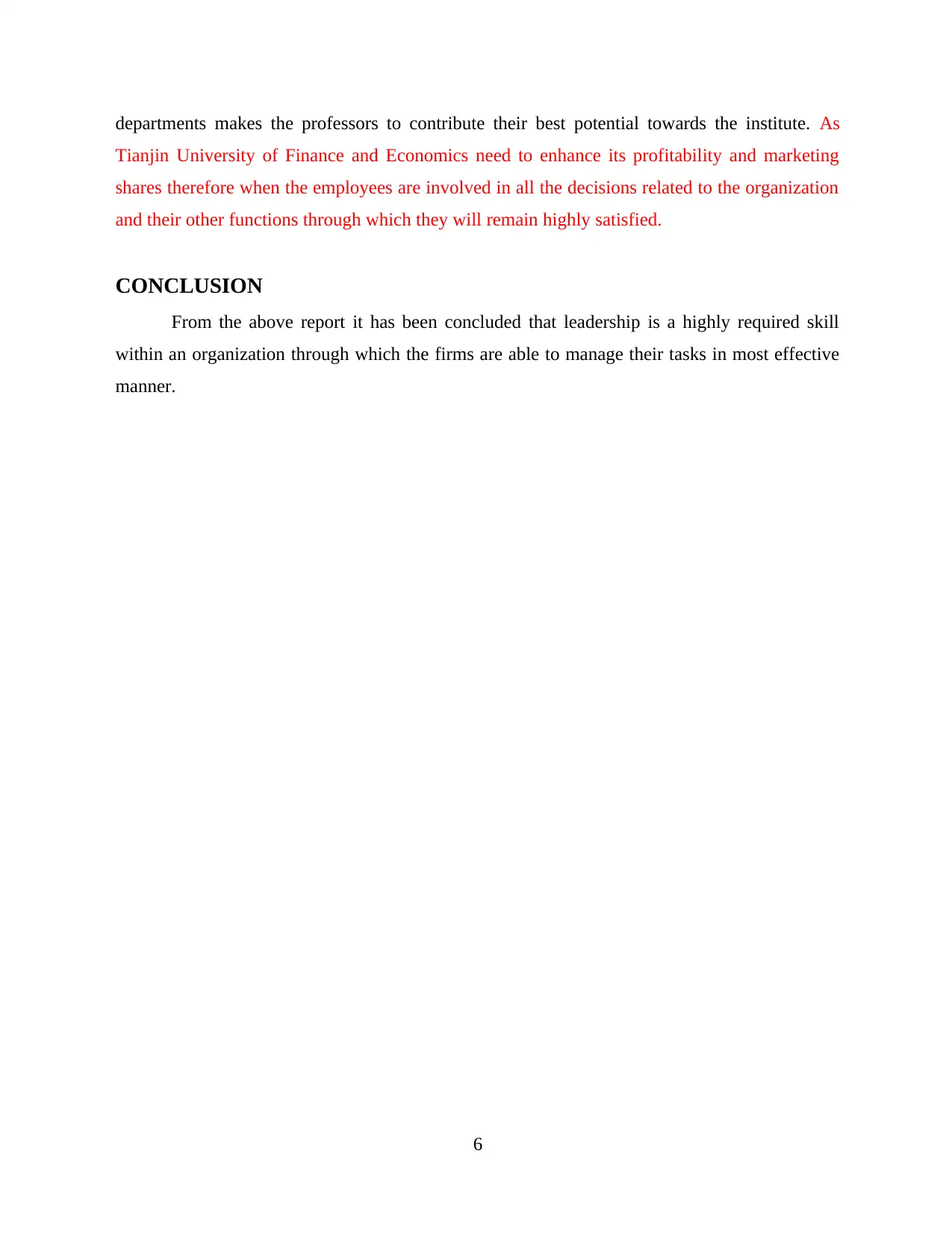
departments makes the professors to contribute their best potential towards the institute. As
Tianjin University of Finance and Economics need to enhance its profitability and marketing
shares therefore when the employees are involved in all the decisions related to the organization
and their other functions through which they will remain highly satisfied.
CONCLUSION
From the above report it has been concluded that leadership is a highly required skill
within an organization through which the firms are able to manage their tasks in most effective
manner.
6
Tianjin University of Finance and Economics need to enhance its profitability and marketing
shares therefore when the employees are involved in all the decisions related to the organization
and their other functions through which they will remain highly satisfied.
CONCLUSION
From the above report it has been concluded that leadership is a highly required skill
within an organization through which the firms are able to manage their tasks in most effective
manner.
6
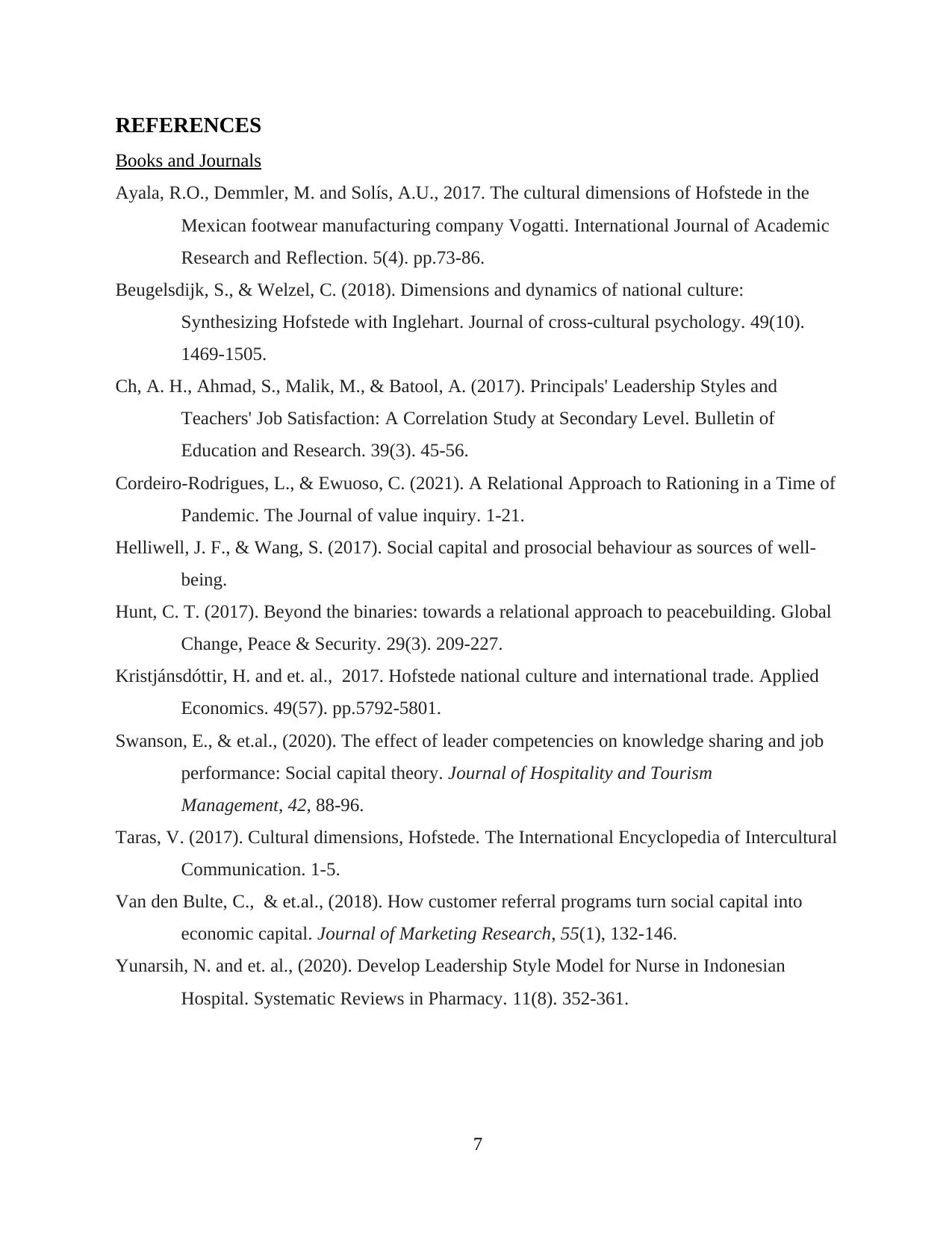
REFERENCES
Books and Journals
Ayala, R.O., Demmler, M. and Solís, A.U., 2017. The cultural dimensions of Hofstede in the
Mexican footwear manufacturing company Vogatti. International Journal of Academic
Research and Reflection. 5(4). pp.73-86.
Beugelsdijk, S., & Welzel, C. (2018). Dimensions and dynamics of national culture:
Synthesizing Hofstede with Inglehart. Journal of cross-cultural psychology. 49(10).
1469-1505.
Ch, A. H., Ahmad, S., Malik, M., & Batool, A. (2017). Principals' Leadership Styles and
Teachers' Job Satisfaction: A Correlation Study at Secondary Level. Bulletin of
Education and Research. 39(3). 45-56.
Cordeiro-Rodrigues, L., & Ewuoso, C. (2021). A Relational Approach to Rationing in a Time of
Pandemic. The Journal of value inquiry. 1-21.
Helliwell, J. F., & Wang, S. (2017). Social capital and prosocial behaviour as sources of well-
being.
Hunt, C. T. (2017). Beyond the binaries: towards a relational approach to peacebuilding. Global
Change, Peace & Security. 29(3). 209-227.
Kristjánsdóttir, H. and et. al., 2017. Hofstede national culture and international trade. Applied
Economics. 49(57). pp.5792-5801.
Swanson, E., & et.al., (2020). The effect of leader competencies on knowledge sharing and job
performance: Social capital theory. Journal of Hospitality and Tourism
Management, 42, 88-96.
Taras, V. (2017). Cultural dimensions, Hofstede. The International Encyclopedia of Intercultural
Communication. 1-5.
Van den Bulte, C., & et.al., (2018). How customer referral programs turn social capital into
economic capital. Journal of Marketing Research, 55(1), 132-146.
Yunarsih, N. and et. al., (2020). Develop Leadership Style Model for Nurse in Indonesian
Hospital. Systematic Reviews in Pharmacy. 11(8). 352-361.
7
Books and Journals
Ayala, R.O., Demmler, M. and Solís, A.U., 2017. The cultural dimensions of Hofstede in the
Mexican footwear manufacturing company Vogatti. International Journal of Academic
Research and Reflection. 5(4). pp.73-86.
Beugelsdijk, S., & Welzel, C. (2018). Dimensions and dynamics of national culture:
Synthesizing Hofstede with Inglehart. Journal of cross-cultural psychology. 49(10).
1469-1505.
Ch, A. H., Ahmad, S., Malik, M., & Batool, A. (2017). Principals' Leadership Styles and
Teachers' Job Satisfaction: A Correlation Study at Secondary Level. Bulletin of
Education and Research. 39(3). 45-56.
Cordeiro-Rodrigues, L., & Ewuoso, C. (2021). A Relational Approach to Rationing in a Time of
Pandemic. The Journal of value inquiry. 1-21.
Helliwell, J. F., & Wang, S. (2017). Social capital and prosocial behaviour as sources of well-
being.
Hunt, C. T. (2017). Beyond the binaries: towards a relational approach to peacebuilding. Global
Change, Peace & Security. 29(3). 209-227.
Kristjánsdóttir, H. and et. al., 2017. Hofstede national culture and international trade. Applied
Economics. 49(57). pp.5792-5801.
Swanson, E., & et.al., (2020). The effect of leader competencies on knowledge sharing and job
performance: Social capital theory. Journal of Hospitality and Tourism
Management, 42, 88-96.
Taras, V. (2017). Cultural dimensions, Hofstede. The International Encyclopedia of Intercultural
Communication. 1-5.
Van den Bulte, C., & et.al., (2018). How customer referral programs turn social capital into
economic capital. Journal of Marketing Research, 55(1), 132-146.
Yunarsih, N. and et. al., (2020). Develop Leadership Style Model for Nurse in Indonesian
Hospital. Systematic Reviews in Pharmacy. 11(8). 352-361.
7
⊘ This is a preview!⊘
Do you want full access?
Subscribe today to unlock all pages.

Trusted by 1+ million students worldwide
1 out of 9
Related Documents
Your All-in-One AI-Powered Toolkit for Academic Success.
+13062052269
info@desklib.com
Available 24*7 on WhatsApp / Email
![[object Object]](/_next/static/media/star-bottom.7253800d.svg)
Unlock your academic potential
Copyright © 2020–2025 A2Z Services. All Rights Reserved. Developed and managed by ZUCOL.





